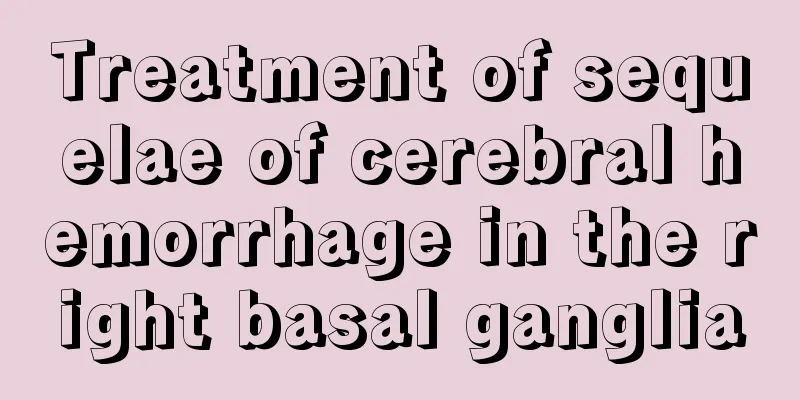How to treat ischemic femoral head necrosis

|
In addition to bacterial infection, femoral head necrosis is also caused by ischemia. Many people believe that ischemic necrosis of the femoral head is not life-threatening, but this is a wrong view. If ischemic femoral head necrosis is left untreated, it will cause certain damage to the body's bone and living tissue. Therefore, we must treat ischemic necrosis of the femoral head in a timely manner. Now let me tell you how to treat ischemic necrosis of the femoral head. 1. Non-surgical treatment. 1. Limit the weight. Strictly limiting weight-bearing or not bearing weight can restore blood supply to ischemic bone tissue and protect it from pressure, thereby controlling the progression of the disease, preventing collapse, and promoting self-healing of the ischemic and necrotic femoral head. It is mainly suitable for patients who are not suitable for surgical treatment, such as the elderly, patients in poor general condition, patients in the advanced stage of ischemic necrosis and patients with poor prognosis. You can first rely on braces such as canes and crutches to limit the load on the affected limb until there is a clinical indication for joint replacement. 2. Electrical stimulation. Electrical stimulation has an osteogenesis effect and can promote fracture healing. Its mechanism may be related to the piezoelectric effect of bone and the ability of electrical stimulation to simulate biological signals. Electrical stimulation can be used as an independent treatment for ischemic necrosis or as an adjunct to surgery. 2. Surgical treatment. Treatment for preserving the femoral head: 1. Drilling decompression. It is mainly used for patients in the early stage without articular surface collapse and is the simplest surgical method for treating femoral head necrosis. The mechanism of action is to reduce intraosseous pressure and promote venous return. Relieve the spasm of the nutrient vessels and allow new blood vessels to grow into the ischemic area through the bone holes. 2. Bone grafting. Because drilling is required before bone grafting, it is also called drilling decompression bone grafting. Its mechanism of action is: drilling to decompress; bone grafting to provide mechanical support; muscle pedicled bone transplantation to increase blood supply to the femoral head. There are many surgical methods, including cancellous bone transplantation, cortical bone transplantation, muscle pedicled bone transplantation, vascular anastomosis bone transplantation and allogeneic osteochondral transplantation. In the early stage, central decompression and cortical bone implantation were often used to treat femoral head necrosis. 3. Osteotomy. By changing the corresponding position relationship between the femoral head and the femoral shaft, the weight-bearing area of the femoral head can be increased. I believe everyone has a certain understanding of how to treat ischemic necrosis of the femoral head. During the treatment process, we must also maintain a positive attitude to fight the disease, quit smoking and drinking, avoid spicy food, eat more foods that nourish the spleen and kidneys, strengthen muscles and bones, supplement calcium and promote blood circulation. Finally, the editor wishes the patient a speedy recovery. |
<<: Is it okay to brush your teeth for too long?
>>: How long does it take to treat schizophrenia
Recommend
How to control TSH value after hemisection of thyroid cancer
TSH value after hemisection of thyroid cancer usu...
Does black tea affect sleep?
We all know that if we drink a lot of tea when we...
What are the methods for cleaning the range hood mesh cover
When cleaning the range hood, you may not know th...
What are the disadvantages of riding a bicycle
What are the disadvantages of riding a bicycle? M...
What should you pay attention to in your diet for thyroid nodules? A reasonable diet is crucial
Thyroid nodules are a very common thyroid disease...
Does saliva smell bad?
There is a liquid in the human mouth that plays a...
How many little life hacks do you know
In life, we often face some situations and we don...
What are the ways to disinfect the scraping board
The disinfection of the scraping board is the fir...
The difference between rheumatism and bone cancer
A 15-year-old girl had a bone tumor (commonly kno...
How to treat conjunctival stones? It turns out to be like this
Conjunctival stones are a common disease among mi...
What is the most dangerous thing about colon cancer recurrence?
What is the most dangerous thing about colon canc...
Can you still use moldy chopsticks?
Many families use wooden chopsticks. If they are ...
What are the early signs of kidney failure?
The kidneys are the core organs of the human body...
Yin deficiency and hyperactivity of fire and premature ejaculation
Yin deficiency and excessive fire and premature e...
Can Pneumonia be cured?
Many people feel that their condition will not ge...









